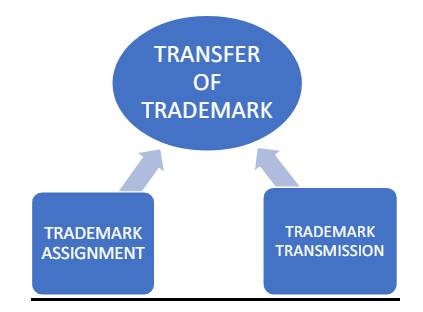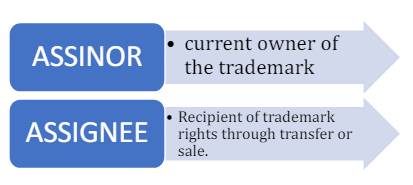Online Trademark assignment in India

Trademark assignment
Trademark assignment refers to the complete or partial transfer of a trademark from one person to another. This transfer can occur both before and after the trademark is officially registered. Whether it's the full ownership or a partial stake, trademark assignment facilitates the seamless exchange of rights between parties. It's a pivotal legal process ensuring that the intellectual property rights associated with a trademark are transferred securely and efficiently. By formalizing the transfer, it solidifies the rights and responsibilities of both the assignor and the assignee in the realm of trademark ownership.

Trademark Transmission:
Trademark transmission refers to the legal process by which the rights associated with a trademark are transferred from the original owner (who may be deceased) to another party, typically their representative or successor. When the owner of a trademark passes away, their rights to the trademark do not cease to exist. Instead, these rights are transferred to someone else, often as outlined in the deceased owner's will or through legal procedures governing inheritance and succession.
The process of trademark transmission involves formal documentation and legal steps to ensure the smooth transfer of ownership rights. This may include obtaining legal recognition of the representative or successor as the new owner of the trademark, updating registration records with relevant authorities, and notifying stakeholders of the change in ownership.
In essence, trademark transmission ensures that the valuable rights associated with a trademark continue to be protected and utilized effectively, even after the original owner is no longer able to manage them. It helps maintain the integrity and value of the trademark while facilitating its continued use in commerce by the new owner or their designated representative.
Need of Trademark assignment in India
In essence, trademark transmission ensures that the valuable rights associated with a trademark continue to be protected and utilized effectively, even after the original owner is no longer able to manage them. It helps maintain the integrity and value of the trademark while facilitating its continued use in commerce by the new owner or their designated representative.
1. COMPANY SOLD OUT:
In scenarios where a company undergoes a change in ownership, such as mergers, acquisitions, or outright sales, the trademarks associated with the company often need to be transferred to the new entity. This ensures that the new owners have legal rights over the trademarks, enabling them to continue utilizing these marks without any legal ramifications.
2. MULTIPLE TRADEMARKS:
Companies often possess multiple trademarks, each representing different aspects of their business. When such companies restructure or realign their operations, they might opt to assign specific trademarks to different entities within the organization. This streamlines the management of trademarks and aligns them with the strategic objectives of the business.
BENEFITS OF TRADEMARK ASSIGNMENT IN India
1. LEGAL PROOF: The assignment of trademarks through proper legal channels provides concrete evidence of the transfer of ownership. This documentation serves as a vital legal safeguard, protecting both the assignor and the assignee from any potential disputes or challenges regarding ownership rights in the future.
2. EXPANSION OF BUSINESS: For companies aiming to expand their operations or enter new markets, the assignment of trademarks facilitates smooth transitions. By transferring trademark rights to subsidiaries, franchisees, or partners, businesses can establish a consistent brand presence across different geographical locations, thereby enhancing brand visibility and market penetration.
3. MONETARY BENEFIT TO ASSIGNOR: Trademark assignment can also be a lucrative financial decision for the assignor. Through the transfer of trademark rights, the assignor can negotiate financial arrangements, such as one-time payments or ongoing royalties, providing them with a source of income in exchange for relinquishing their trademark rights.
Companies often possess multiple trademarks, each representing different aspects of their business. When such companies restructure or realign their operations, they might opt to assign specific trademarks to different entities within the organization. This streamlines the management of trademarks and aligns them with the strategic objectives of the business.
Document Required
AFFIDAVIT OF THE ASSIGNOR: A sworn statement by the assignor affirming their intention to transfer ownership of the trademark(s) to the assignee.
ASSIGNMENT DEED: A legally binding document outlining the terms and conditions of the trademark transfer, signed by both the assignor and the assignee.
ASSIGNEE AND ASSIGNOR ID PROOFS: Identification proofs of both the assignor and the assignee, verifying their identities and establishing their legal capacity to enter into the trademark assignment agreement.
POWER OF ATTORNEY, IF APPLICABLE
COPY OF TRADEMARK REGISTRATION CERTIFICATE
PROOF OF PAYMENT OF PRESCRIBED FEES
Types of Trademark assigment in India

1. ASSIGNMENT OF REGISTRED TRADEMARK:
Assignment of a registered trademark involves transferring the ownership rights of the trademark from one party (the assignor) to another (the assignee). When a trademark has built goodwill in the market through continuous use by its owner to promote products or services, it becomes an asset with inherent value. The assignment of such a trademark typically involves a legal agreement between the parties detailing the terms and conditions of the transfer
The assignor relinquishes all rights and interests in the trademark, including its associated goodwill, to the assignee. This transfer of ownership may be partial or complete, and it is crucial to ensure that the assignment is properly documented and registered with the appropriate trademark office to maintain legal validity.
2. ASSIGNMENT OF TRADEMARK WITH GOODWILL:
The assignor relinquishes all rights and interests in the trademark, including its associated goodwill, to the assignee. This transfer of ownership may be partial or complete, and it is crucial to ensure that the assignment is properly documented and registered with the appropriate trademark office to maintain legal validity
3. ASSIGNMENT OF TRADEMARK WITHOUT GOODWILL:
When a trademark is assigned without goodwill, it means that the buyer only acquires the right to use the mark itself, without inheriting any of the reputation, customer loyalty, or other intangible benefits (goodwill) that may be associated with the mark due to its past use in commerce. This distinction is important because the value of a trademark assigned without goodwill may be different from one assigned with goodwill.
4. ASSIGNMENT OF UNREGISTERED TRADEMARK:
When an unregistered trademark is assigned, the liabilities and accountability associated with that trademark are typically transferred along with the ownership rights. This means that the assignee (the party receiving the trademark) assumes responsibility for any legal obligations, liabilities, or disputes related to the trademark, just as the assignor (the party transferring the trademark) was responsible for them prior to the assignment.
It's important for both parties involved in the assignment of an unregistered trademark to clearly define these liabilities and accountabilities in the assignment agreement. This agreement should outline any ongoing legal proceedings, disputes, or potential risks associated with the trademark, and specify how they will be addressed by both parties’ post-assignment.
Additionally, it's advisable for the assignee to conduct due diligence before accepting the assignment to ensure they understand any potential legal issues or liabilities they may be assuming by acquiring the unregistered trademark. This can help mitigate risks and avoid unexpected legal challenges down the line.
ONLINE PROCEDURE OF TRADEMARK ASSSIGNMENT IN INDIA:
1. FORM FILL TM-P TO TRADEMARK REGISTRAR:
The assignor must fill out Form TM-P and submit it with the fees of Rs.9000/- to the relevant Trademark Registrar office, providing details of the trademark assignment
2. APPLICATION ACCEPTANCE:
Upon acceptance of the application by the Trademark Registrar, both the assignor and the assignee are informed, and a date for the formalization of the trademark assignment is set
3. REJECTION OF THE APPLICATION:
If the application contains incorrect information or if the assignment is not beneficial to others, the trademark registrar has the authority to reject it. This is likely a measure to ensure that trademark assignments are conducted accurately and in a way that doesn't negatively impact others. If you need more detailed information or assistance with understanding trademark assignment processes, feel free to ask!
FREQUENTLY ASKED QUESTIONS (FAQs)
Q. Which form should be submitted for the application of trademark assignment?
Ans. FORM. TM-P
Q. What are the prescribed fees for online as well as offline trademark assignment?
Ans. Via. Online mode Rs.9000/- or via offline mode Rs. 10000/-
Q. What is the difference between trademark assignment and trademark licensing?
Ans. Trademark assignment involves the complete transfer of ownership rights in a trademark, whereas trademark licensing grants permission to another party to use the trademark while the ownership remains with the licensor. In a trademark transfer, the assignee becomes the new owner of the trademark, whereas, in trademark licensing, the licensee has limited rights to use the trademark.
Q. Can a foreign entity assign a trademark in India?
Ans. Yes, a foreign entity can assign a trademark in India. However, the assignment must comply with the applicable laws and regulations, and the necessary documents must be submitted to the Trademark Registry for registration.
Q. What are the different types of Trademark Assignments?
Ans. The different types of trademark assignment are:
- Complete Assignment: The entire ownership of a trademark is transferred to a new owner, making them the sole owner with full rights and control
- Partial Assignment: Ownership of a trademark is transferred for specific goods or services while retaining ownership for others.
- Assignment with Goodwill: The trademark is transferred along with the business or part of the business, including the associated goodwill.
- Assignment without Goodwill: The trademark is transferred independently, without any associated business or goodwill.

